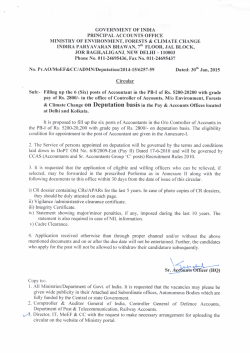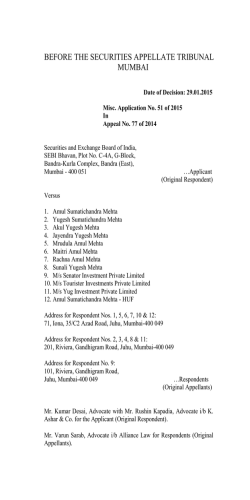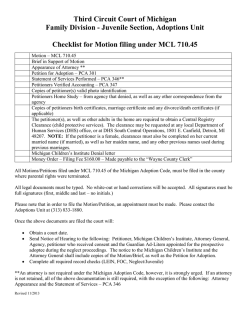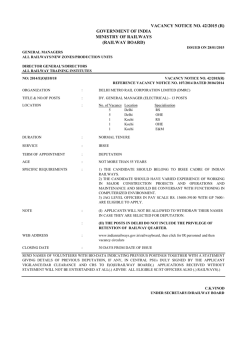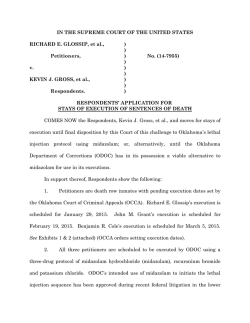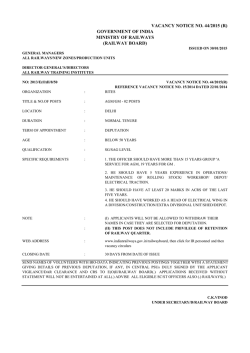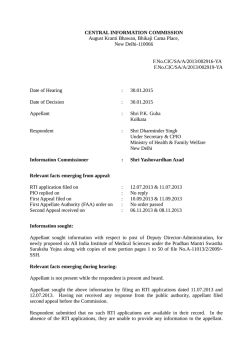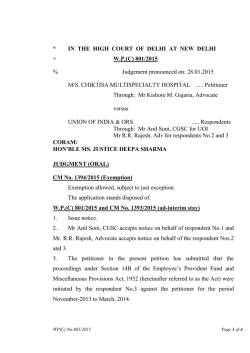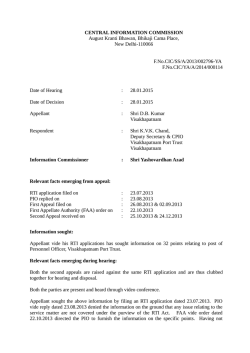
* IN THE HIGH COURT OF DELHI AT NEW DELHI + W.P.(C) 9371
* + IN THE HIGH COURT OF DELHI AT NEW DELHI W.P.(C) 9371/2014 & conn. matters 28th January, 2015 % 1. W.P.(C) No.9371/2014 and C.M. No.21189/2014 MEENU AND ORS. Through: ..... Petitioners Mr. R.K. Saini, Advocate with Ms. Aastha Chopra, Advocate. versus INTEGRATED DISTRICT HEALTH SOCIETY AND ORS. .... Respondents Through: 2. Ms. Latika Chaudhary, Advocate for respondent Nos. 1 to 3. Mr. Anuj Aggarwal, Advocate for respondent No.4. W.P.(C) No.9374/2014 and C.M. No.21193/2014 ANITA NEGI AND ORS. Through: ..... Petitioners Mr. R.K. Saini, Advocate with Ms. Aastha Chopra, Advocate. versus INTEGRATED DISTRICT HEALTH SOCIETY AND ORS. .... Respondents Through: W.P.(C) No. 9371/2014 & conn. matters Ms. Latika Chaudhary, Advocate for respondent Nos. 1 to 3. Mr. Anuj Aggarwal, Advocate for respondent No.4. Page 1 of 24 3. W.P.(C) No.9375/2014 and C.M. No.21194/2014 SUMIT KAUSHIK AND ORS. ..... Petitioners Through: Mr. R.K. Saini, Advocate with Ms. Aastha Chopra, Advocate. versus INTEGRATED DISTRICT HEALTH SOCIETY AND ORS. .... Respondents Through: Ms. Latika Chaudhary, Advocate for respondent Nos. 1 to 3. Mr. Anuj Aggarwal, Advocate for respondent No.4. 4. W.P.(C) No.9376/2014 and C.M. No.21195/2014 TAHREEM PARVEEN AND ANR. ..... Petitioners Through: Mr. R.K. Saini, Advocate with Ms. Aastha Chopra, Advocate. versus INTEGRATED DISTRICT HEALTH SOCIETY AND ORS. .... Respondents Through: Ms. Latika Chaudhary, Advocate for respondent Nos. 1 to 3. Mr. Anuj Aggarwal, Advocate for respondent No.4. 5. W.P.(C) No.9377/2014 and C.M. No.21196/2014 DR. SHABNAM SIDDIQUI AND ORS. ..... Petitioners Through: Mr. R.K. Saini, Advocate with Ms. Aastha Chopra, Advocate. versus INTEGRATED DISTRICT HEALTH SOCIETY AND ORS. .... Respondents Through: Ms. Latika Chaudhary, Advocate for respondent Nos. 1 to 3. W.P.(C) No. 9371/2014 & conn. matters Page 2 of 24 Mr. Anuj Aggarwal, Advocate for respondent No.4. 6. W.P.(C) No.9369/2014 and C.M. No.21187/2014 YOGESH KUMAR AND ORS. Through: ..... Petitioners Mr. R.K. Saini, Advocate with Ms. Aastha Chopra, Advocate. versus INTEGRATED DISTRICT HEALTH SOCIETY AND ORS. .... Respondents Through: Ms. Latika Chaudhary, Advocate for respondent Nos. 1 to 3. Mr. Anuj Aggarwal, Advocate for respondent No.4. 7. W.P.(C) No.9370/2014 and C.M. No.21188/2014 SWETA JAIN AND ORS. Through: ..... Petitioners Mr. R.K. Saini, Advocate with Ms. Aastha Chopra, Advocate. versus INTEGRATED DISTRICT HEALTH SOCIETY AND ORS. .... Respondents Through: Ms. Latika Chaudhary, Advocate for respondent Nos. 1 to 3. Mr. Anuj Aggarwal, Advocate for respondent No.4. 8. W.P.(C) No.9372/2014 and C.M. No.21190/2014 ABHISHEK BHARTI AND ORS. Through: ..... Petitioners Mr. R.K. Saini, Advocate with Ms. Aastha Chopra, Advocate. versus W.P.(C) No. 9371/2014 & conn. matters Page 3 of 24 INTEGRATED DISTRICT HEALTH SOCIETY AND ORS. .... Respondents Through: Ms. Latika Chaudhary, Advocate for respondent Nos. 1 to 3. Mr. Anuj Aggarwal, Advocate for respondent No.4. 9. W.P.(C) No.9373/2014 and C.M. No.21192/2014 SURENDER KUMAR AND ORS. Through: ..... Petitioners Mr. R.K. Saini, Advocate with Ms. Aastha Chopra, Advocate. versus INTEGRATED DISTRICT HEALTH SOCIETY AND ORS. .... Respondents Through: Ms. Latika Chaudhary, Advocate for respondent Nos. 1 to 3. Mr. Anuj Aggarwal, Advocate for respondent No.4. CORAM: HON’BLE MR. JUSTICE VALMIKI J.MEHTA To be referred to the Reporter or not? YES VALMIKI J. MEHTA, J (ORAL) 1. All the aforesaid writ petitions are being disposed of by this common judgment as issues involved in these cases are the same. For the sake of convenience, reference is made to the facts of W.P.(C) No.9371/2014. 2. At the outset, I would like to state that I fail to understand why in spite of the binding ratio of the Constitution Bench judgment of the W.P.(C) No. 9371/2014 & conn. matters Page 4 of 24 Supreme Court in the case of Secretary, State of Karnataka Vs. Umadevi & Ors. (2006) 4 SCC 1 certain litigants file writ petitions effectively to seek directions which will amount to flouting the ratio of the Constitution Bench judgment in the case of Umadevi & Ors. (supra). The Constitution Bench of the Supreme Court in the case of Umadevi & Ors.(supra) has specifically laid down the ratio that the appointments which have to be made by the government or any authority which is a State under Article 12 of the Constitution of India can only be if four aspects are satisfied viz firstly there must exist sanctioned posts, secondly there must exist vacancies in sanctioned posts, thirdly the appointments must be by means of open competition after insertion of advertisement in the newspaper and/or by calling candidates from employment exchange and lastly/fourthly the persons employed have to be qualified in terms of the recruitment rules. The following is the ratio of the Constitution Bench judgment of the Supreme Court in the case of Umadevi & Ors. (supra):“(I) The questions to be asked before regularization are:- (a)(i) Was there a sanctioned post (court cannot order creation of posts because finances of the state may go haywire), (ii) is there a vacancy, (iii) are the persons qualified persons and (iv) are the appointments through regular recruitment process of calling all possible persons and which process involves inter-se competition among the candidates W.P.(C) No. 9371/2014 & conn. matters Page 5 of 24 (b) A court can condone an irregularity in the appointment procedure only if the irregularity does not go to the root of the matter. (II) For sanctioned posts having vacancies, such posts have to be filled by regular recruitment process of prescribed procedure otherwise, the constitutional mandate flowing from Articles 14,16,309, 315, 320 etc is violated. (III) In case of existence of necessary circumstances the government has a right to appoint contract employees or casual labour or employees for a project, but, such persons form a class in themselves and they cannot claim equality(except possibly for equal pay for equal work) with regular employees who form a separate class. Such temporary employees cannot claim legitimate expectation of absorption/regularization as they knew when they were appointed that they were temporary inasmuch as the government did not give and nor could have given an assurance of regularization without the regular recruitment process being followed. Such irregularly appointed persons cannot claim to be regularized alleging violation of Article 21. Also the equity in favour of the millions who await public employment through the regular recruitment process outweighs the equity in favour of the limited number of irregularly appointed persons who claim regularization. (IV) Once there are vacancies in sanctioned posts such vacancies cannot be filled in except without regular recruitment process, and thus neither the court nor the executive can frame a scheme to absorb or regularize persons appointed to such posts without following the regular recruitment process. (V) At the instance of persons irregularly appointed the process of regular recruitment shall not be stopped. Courts should not pass interim orders to continue employment of such W.P.(C) No. 9371/2014 & conn. matters Page 6 of 24 irregularly appointed persons because the same will result in stoppage of recruitment through regular appointment procedure. (VI) If there are sanctioned posts with vacancies, and qualified persons were appointed without a regular recruitment process, then, such persons who when the judgment of Uma Devi is passed have worked for over 10 years without court orders, such persons be regularized under schemes to be framed by the concerned organization. (VII) The aforesaid law which applies to the Union and the States will also apply to all instrumentalities of the State governed by Article 12 of the Constitution”. 3. There are three exceptions to the ratio of the judgment in the case of Umadevi & Ors. (supra). The first exception is that as per para 53 of the judgment in the case of Umadevi & Ors. (supra) and which provided that those employees who had worked for ten years prior to passing of the judgment in the case of Umadevi & Ors. (supra) if they were selected by regular recruitment process and qualified persons were appointed against vacancies in sanctioned posts, government will prepare a scheme for regularizing such employees who have worked in such posts for 10 years without having benefit of any stay order from any Court or Tribunal. The second exception with respect to the judgment in the case of Umadevi & Ors. (supra) is that a contractual employee or project employee cannot be terminated from service for being replaced by another contractual employee W.P.(C) No. 9371/2014 & conn. matters Page 7 of 24 or a project employee. This was so held by the Supreme Court in the case of State of Haryana and Ors. etc. etc. Vs. Piara Singh and Ors. etc. etc. (1992) 4 SCC 118 and whose ratio that one contractual employee cannot be replaced by another contractual employee was approved by the Constitution Bench in the case of Umadevi & Ors. (supra). The third exception is an exception which is carved out in view of the judgment of the Supreme Court in the case of Mohd. Abdul Kadir and Anr. Vs. Director General of Police, Assam and Ors. (2009) 6 SCC 611 and which exception is that where persons have already worked for decades in the posts which were not sanctioned posts, since the work is perennial in nature because of which the employment has continued for decades, government has been ordered to consider creation of appropriate posts and regularization of the persons who have been working for decades in the posts in contractual/project posts. 4. So far as the first exception to the case of Umadevi and Ors. (supra) is concerned, admittedly the petitioners do not fall in that category/exception, and therefore petitioners do not even claim entitlement to be regularized on that count. 5. So far as second exception is concerned, I have had an occasion to recently examine the same in the case of Abhinav Chaudhary & Ors. Vs. W.P.(C) No. 9371/2014 & conn. matters Page 8 of 24 Delhi Technological University & Anr. in W.P.(C) No.3512/2014 decided on 20.1.2015 and the relevant paras of the said judgment are paras 2 to 5 and the same read as under:“2. The only grievance of the petitioners is that a contractual appointee cannot be replaced by any other contractual appointee. Petitioners claim that no doubt petitioners cannot seek regularization, however, it is argued that one contractual employee cannot be replaced by another contractual employee on more or less the same terms. Reliance is placed upon the judgment of the Supreme Court in the case of State of Haryana and Ors. etc. etc. Vs. Piara Singh and Ors. etc. etc. (1992) 4 SCC 118 which holds that one work charged/casual employee/daily worker cannot be replaced by any worker of same category. It is argued that the ratio of the judgment of the Supreme Court in the case of Piara Singh and Ors. (supra) has been approved by the Supreme Court in the Constitution Bench judgment of the Supreme Court in the case of Secretary, State of Karnataka Vs. Umadevi & Ors. (2006) 4 SCC 1. The judgment in the case of Piara Singh and Ors. (supra) is referred to in paras 23 to 25 of the judgment in the case of Umadevi (supra). In para 26, the Constitution Bench in the case of Umadevi (supra) only disagreed with that direction of Piara Singh and Ors.’s case (supra) which requires regularization of ad hoc or temporary or casual employee. In para 25 of the judgment in the case of Umadevi (supra) para 46 of the Piara Singh and Ors.’s case (supra) is referred to and which para 46 states that an ad hoc or temporary employee should not be replaced by any other ad hoc or temporary employee and such an employee can only be replaced by a regularly selected employee and which is to avoid any arbitrary action on the part of the appointing authority. 3. The ratio and spirit of the judgments of the Supreme Court in the cases of Piara Singh and Ors. (supra) and Umadevi (supra) has been applied and reiterated by the Supreme Court in the judgment in the case of Mohd. Abdul Kadir and Anr. Vs. Director General of Police, Assam and Ors. (2009) 6 SCC 611 and which states that a person who is employed under the scheme has to continue in the employment till the continuation of the scheme and such a person’s W.P.(C) No. 9371/2014 & conn. matters Page 9 of 24 services cannot come to an end/ terminated before the expiry of the scheme except of course on disciplinary grounds or unsatisfactory services or medical grounds or attaining the normal age of retirement. Paras 17 and 18 of the judgment in the case of Mohd. Abdul Kadir and Anr. (supra) are relevant and the same read as under:“17. When the ad hoc appointment is under a scheme and is in accordance with the selection process prescribed by the scheme, there is no reason why those appointed under the scheme should not be continued as long as the scheme continues. Ad-hoc appointments under schemes are normally co-terminus with the scheme (subject of course to earlier termination either on medical or disciplinary grounds, or for unsatisfactory service or on attainment of normal age of retirement). Irrespective of the length of their ad hoc service or the scheme, they will not be entitled to regularization nor to the security of tenure and service benefits available to the regular employees. In this background, particularly in view of the continuing Scheme, the ex-serviceman employed after undergoing selection process, need not be subjected to the agony, anxiety, humiliation and vicissitudes of annual termination and re-engagement, merely because their appointment is termed as ad hoc appointments. 18. We are therefore of the view that the learned Single Judge was justified in observing that the process of termination and reappointment every year should be avoided and the appellants should be continued as long as the Scheme continues, but purely on ad hoc and temporary basis, co- terminus with the Scheme. The Circular dated 173-1995 directing artificial breaks by annual terminations followed by fresh appointment, being contrary to the PIF Additional Scheme and contrary to the principles of service jurisprudence, is liable to be is quashed.” (underlining added) 4(i) A reference to the new advertisement which has now been issued by the respondent no.1 for appointment to the posts of Assistant Professors for contractual period, shows that the persons to be appointed in terms of the impugned advertisement are Assistant Professors and they are to be employed on the same monetary emoluments on which the present petitioners-Assistant Professors are working i.e there is no change in the monetary emoluments with W.P.(C) No. 9371/2014 & conn. matters Page 10 of 24 respect to new Assistant Professors who are sought to be appointed on contractual terms by the respondent no.1. The only difference is that the new appointments are for 11 months instead of 9 months and which difference according to counsel for respondent no.1 is a new term and therefore it is argued that the present is not a case where one contractual employee is sought to be replaced by another contractual employee in view of the difference of the term of 9 months and 11 months. (ii) In my opinion, the difference of two months i.e between 9 months and 11 months and salary with respect to the additional period of two months in the new contractual post is not such a substantial difference for the respondent no.1 to contend that one contractual employee can be replaced by other contractual employee. For the sake of argument let us take that the case was a case of replacing a contractual employee of 11 months with a contractual employee for a substantially large period of lets say three years or more, then, may be in such a case depending on facts of such a case, the employer could contend that terms and conditions are substantially different and consequently it would not be a case where a contractual employee is sought to be replaced by a similar other contractual employee. In my opinion, arguing that two months difference makes the petitioners’ employment different with the persons who have been selected pursuant to the impugned advertisement dated 28.4.2014/1.5.2014, is an argument really one of gross arbitrariness on the part of the employer/respondent no.1 and which needs to be adversely commented upon by this Court. 5. In view of the above, the case of the petitioners clearly falls within the ratios of the judgments of the Supreme Court in the cases of Piara Singh and Ors., Umadevi and Ors. and Mohd. Abdul Kadir andAnr.(all Supra) and since one contractual employee cannot be replaced by other contractual employee, and which action will show gross arbitrariness on the part of the respondent no.1, the present writ petition is allowed and respondents are restrained from in any manner terminating the services of the petitioners from the contractual posts of Assistant Professors at which they are working with the respondent no.1/employer. Of course, this will not disentitle the respondent no.1 to appoint any additional Assistant Professors with the respondent no.1 in accordance with its applicable rules or issue fresh advertisements W.P.(C) No. 9371/2014 & conn. matters Page 11 of 24 having contractually substantially different terms than what the petitioners are presently working at.” 6. The petitioners however do not seek any relief that they cannot be replaced with other contractual employees and hence no directions are given with respect to continuation of contractual appointments of the petitioners. 7. In this writ petition, the petitioners who are admittedly only contractual employees of respondent no.1 viz the Integrated District Health Society essentially seek two reliefs. The first relief claimed is for regularization of the petitioners to the posts by impugning the relevant recruitment rules which only allow contractual employment by the respondent no.1/employer including by placing reliance upon the office memorandum dated 23.5.2011 issued by the Government of NCT of Delhi that temporary posts which are in existence for more than three years should be filled up on long term basis and once the work is of permanent nature the temporary posts should be converted into permanent posts. The second relief which is claimed is of ‘equal pay for equal work’ on the ground that the respondent no.1 has two sets of similar employees; one set of employees are the petitioners and the other set of employees are those employees of the W.P.(C) No. 9371/2014 & conn. matters Page 12 of 24 respondent no.1 who are on deputation from the Government of NCT of Delhi, and the petitioners who are contractual employees since they are doing the same work as the employees who are on deputation from the Government of NCT of Delhi, both the categories of employees must have the same pay. 8. So far as the claim of the petitioners that they be converted from contractual employees to permanent employees is concerned, the petitioners effectively seek the relief with respect to seeking appointments of the petitioners on permanent sanctioned posts and that the same be done because of existence of vacancies in those permanent sanctioned posts. Related to this aspect will be the aspect that even if the posts are temporary in nature the posts must be the posts converted into permanent posts in view of the office memorandum dated 23.5.2011 of the Government of NCT of Delhi, Annexure P-5. 9. Before proceeding further, one aspect which is required to be noticed is that the petitioners admittedly are not employees of the Government of NCT of Delhi/respondent no.3. Petitioners are admittedly employees of the respondent no.1 and which is said to be a society registered under the Societies Registration Act, 1860. Respondent no.1/society is said W.P.(C) No. 9371/2014 & conn. matters Page 13 of 24 to be working under the directions of the Directorate of Health Services of respondent no.3 and is an authority/State as per Article 12 of the Constitution of India as it is totally controlled and funded by the respondent no.3. Petitioners are therefore not government employees viz they are not the employees of the Government of NCT of Delhi but they are employees of an autonomous organization which is a State under Article 12 of the Constitution of India and functioning under the control and direction of the respondent no.3/Government of NCT of Delhi. 10. I do not find any pleading whatsoever in the writ petition that respondent no.1 has created and there exists sanctioned posts to which petitioners are working being the posts of Computer Data Entry Operator(CDEO). In other cases, the petitioners of those cases are, besides computer data entry operators, staff nurses, auxiliary nurses, pharmacists, lab technicians and lab assistants. If there did exist sanctioned posts which were created by the respondent no.1 and which obviously would only have been with concurrence of the respondent no.3 which funds the respondent no.1, then, this case would have been further examined with respect to whether there were vacancies in such permanent sanctioned posts of the respondent no.1, but since there are no pleadings or any documents filed with the writ W.P.(C) No. 9371/2014 & conn. matters Page 14 of 24 petitions of the respondent no.1 showing creation and existence of sanctioned posts with respect to various posts in which the petitioners are working, and existence of which sanctioned posts with vacancies in such sanctioned posts being sine qua nons for the petitioners to claim permanency in their employment with the respondent no.1, therefore, in the absence of pleadings as also necessary supporting documents showing that their does exist sanctioned posts and vacancies in sanctioned posts at which the petitioners are working with the respondent no.1, no relief of regularization of the petitioners can be granted by making the petitioners’ services permanent in the posts in which they are working with the respondent no.1. 11. It also bears note that admittedly, the respondent no.1 is only a society registered under the Societies Registration Act, 1860. The purpose of the society is with respect to health mission in Delhi. Respondent no.1/society however being a society registered under the Societies Registration Act, 1860 by its very nature of being registered as a society the same will have permanence or existence only to the extent that it would continue till it continues to be registered as a society i.e what is being stated is that respondent no.1 entity is not a permanent entity like the respondent no.3/Government of NCT of Delhi. Putting it differently, the respondent no.1 at best would be undertaking a project with respect to health mission on W.P.(C) No. 9371/2014 & conn. matters Page 15 of 24 behalf of respondent no.3 and the posts of the respondent no.1 therefore cannot be and are not of the respondent no.3/Government of NCT of Delhi and the posts are hence project posts with the project being the health mission being implemented by the respondent no.3 through the respondent no.1. There cannot be regularization of posts which would continue beyond the project i.e the posts of respondent no.1 will have to come to an end with the project the respondent no.1 is implementing for the respondent no.3. 12. Also, it is trite that this Court cannot order creation of sanctioned posts because creation of sanctioned posts is ordinarily an exclusive prerogative of the executive and the same is done after the assimilation of data of jobs (and its nature) with the respondent no.1 and which has to be taken with the finance of the State which would be available with respect to the posts to be created in the respondent no.1. Only after such detailed exercise is undertaken and completed would a decision be taken as to whether the respondent no.1 should have sanctioned posts and which would depend upon the project which is implemented by the respondent no.1. 13. Therefore, neither can this Court order creation of sanctioned permanent posts of the respondent no.1 nor have the petitioners pleaded that W.P.(C) No. 9371/2014 & conn. matters Page 16 of 24 with respect to the posts in which petitioners are working there exist duly sanctioned posts and vacancies in such sanctioned posts of the respondent no.1. 14. In view of the above factual and legal position, the petitioners therefore cannot claim that they should be made permanent with respect to the contractual posts to which they are contractually employed and that too for limited periods. It is noted that there is no dispute that petitioners in terms of their appointment letters, as also the advertisement under which they were appointed, only had contractual appointments for a specified period. Therefore, no relief can be granted to the petitioners that petitioners should be made permanent in the contractual posts in which they were working with the respondent no.1. The issue then arises is whether petitioners’ posts can be made 15. permanent in view of the office memorandum dated 23.5.2011. Since language of this office memorandum is relevant, I reproduce the same as under:“ OFFICE MEMORANDUM Subject: Conversion of Temporary posts into Permanent ones. While processing the proposals regarding continuation of temporary posts received from various Departments, it has come to the notice of W.P.(C) No. 9371/2014 & conn. matters Page 17 of 24 FD that some Department have not taken any initiative for conversion of posts from temporary to permanent even though the said posts were created several years ago and even if the same were in existence for more than three years. As per the existing instructions, issued by the Government of India, on the subject, 90% of the temporary posts involving work of permanent nature which have been in existence for more than three years can be converted into permanent ones. The action for the conversion of temporary posts into permanent ones is required to be taken by the Heads of Departments, concerned on the strength of which the said temporary posts have actually been created. The conversion of temporary posts is required to be considered with reference to the nature of work in consultation with the Associate Finance of the Department. If the scheme/project for which posts were created involves work/activity of continuing nature, then the posts may be converted into permanent ones. All the Departments, are therefore, requested to initiate necessary steps to convert the temporary posts involving work of permanent nature into permanent ones in consultation with the Associate Finance of the Department, concerned, provided the same posts were in existence for more than three years, were actually filled up and that the posts are required on a long term basis. The Department shall also furnish the detailed reasons as to why the said temporary posts could not be converted into permanent ones while submitting proposal to Finance Department for continuation of posts, otherwise it will be difficult to concur the continuation of the said temporary posts. This issues with the approval of Pr. Secretary (Finance).” 16. No doubt, this office memorandum dated 23.5.2011 issued by the Government of NCT of Delhi talks of conversion of temporary posts into permanent posts once the temporary posts are in existence for more than three years, however, the said office memorandum by its language will apply only with respect to employees and posts in the Government of NCT of W.P.(C) No. 9371/2014 & conn. matters Page 18 of 24 Delhi and not with respect to autonomous organizations working under the control and directions of the respondent no.3. It is important to note that whereas the government would have unlimited finance however autonomous organizations working under the State will only have those limited finances which are given as funds to the said organizations viz the terms of employment and monetary emoluments of an autonomous organization cannot be identical with the government employees. Every autonomous organization fixes its pay scales in consultation and concurrence with the parent ministry of such autonomous organization and the Ministry of Finance. I need not cite catena of case law holding that employees of autonomous organizations which are State/authority under Article 12 of the Constitution of India need not and cannot have the same pay scales which are granted to the regular employees of the government unless the said monetary emoluments are specifically sanctioned by the government with respect to the concerned autonomous organization/authority of the State. Therefore, petitioners also cannot derive any benefit from the office memorandum dated 23.5.2011 inasmuch as the same does not apply to the posts of the respondent no.1 but only applies to the temporary posts of the respondent no.3. W.P.(C) No. 9371/2014 & conn. matters Page 19 of 24 17.(i) Now I at this stage consider the third exception to Uma Devi’s case (supra) as to whether in terms of observations of the Supreme Court in the case of Mohd. Abdul Kadir and Anr. (supra) and certain Division Bench judgments of this Court including in the case of Sonia Gandhi & Ors. Vs. Govt. of NCT of Delhi & Ors. W.P.(C) No. 6798/2002 decided on 6.11.2013, whether this Court should give directions to the government to create posts in view of the perennial nature of the work of the respondent no.1. The relevant paras 20 to 22 of Mohd. Abdul Kadir’s case (supra) read as under: "20. The PIF Scheme has been in force for nearly five decades. PIF Additional Scheme has been in force for more than two decades. The object of the Scheme is detection and deportation of illegal immigrants/fresh infiltrators/re-infiltrators, establishment of second line of defence on Assam-Bangladesh Border to man the areas not covered by Border Security Force and monitoring the occurrences on international border. The staff entrusted with such sensitive functions and duties can work wholeheartedly and with commitment in adverse and hostile conditions only if they have security of tenure, without having to constantly worry about their future. If the task under the Scheme is perennial, there is no point in executing it as a "temporary" scheme, though to start with it might have been thought that the task was a short-term task. 21. Another aspect to be noticed is that duties discharged by the Border staff belonging to Assam Police Border Organization under the PIF Scheme is said to be somewhat similar or parallel to the duties discharged by regular forces like Border Security Force and Assam Special Peace Keeping Force. Further, part of the very same Border Organization under PIF Scheme is manned by regular police personnel. Therefore, if those working as ad hoc or temporary staff for W.P.(C) No. 9371/2014 & conn. matters Page 20 of 24 decades on, are converted to regular permanent staff, that would boost their morale and efficiency. 22. We are conscious of the fact that the issue is a matter of policy having financial and other implications. But where an issue involving public interest has not engaged the attention of those concerned with policy, or where the failure to take prompt decision on a pending issue is likely to be detrimental to public interest, courts will be failing in their duty if they do not draw attention of the concerned authorities to the issue involved in appropriate cases. While courts cannot be and should not be makers of policy, they can certainly be catalysts, when there is a need for a policy or a change in policy." (ii) This Court however cannot order creation of permanent posts in the facts of this case because the employments of the petitioners in all these writ petitions are just of the vintage of approximately of the year 2008 and therefore in the year 2015 it cannot be said with certainty that the work of the respondent no.1 is perennial in nature for creation of permanent posts. Directions have been passed by the Supreme Court in the case of Mohd. Abdul Kadir and Anr.(supra) and by the Division Bench of this Court in the case of Sonia Gandhi & Ors. (supra) only when and because the employees had worked for either a decade and a half or for many decades. At this present stage in the year 2015 thus as regards petitioners appointed in around 2008, I am not inclined to make any observations or pass any directions as to whether the work of the respondent no.1 is or is not perennial, is or is not to be continued perennially and that in view of the perennial nature of the work/project of the respondent no.1 the employees of the respondent no.1 W.P.(C) No. 9371/2014 & conn. matters Page 21 of 24 should be suggested for being employed permanently against sanctioned posts. 18. (i) That takes us to the second argument urged on behalf of the petitioners that petitioners must get the same scale of pay as granted to those employees who are doing identical work with the petitioners with the only distinction being that such other employees are on deputation with the respondent no.1 from the Government of NCT of Delhi and the petitioners are denied equality of monetary emoluments given to such other deputationists only because petitioners are contractual employees of the respondent no.1. (ii) In this regard, contractual employees, in my opinion, in view of ratio of the judgment of the Supreme Court in the case of Umadevi & Ors. (supra), can only claim contractual rights because they with open eyes sought and got employment only on contractual basis. There is no reason why the dividing line between contractual employees and permanent employees of the respondent no.3/Government of NCT of Delhi should be wiped clean. The effect of allowing the prayer as made by the petitioners alleging ‘equal pay for equal work’ will be that temporary employees will be equated with the regular government employees, and which in the opinion of W.P.(C) No. 9371/2014 & conn. matters Page 22 of 24 this Court cannot be done much less at this stage. Why I am using the expression ‘at this stage’ is because may be at an appropriate point of time when the work of the respondent no.1 after many years would be held to be of perennial nature, and thereafter if the respondent no.1 is directed in accordance with law to consider creation of permanent posts as the work is perennial in nature, then, this issue can be examined at that particular stage, and definitely not today. Also, if the prayer of the petitioners is allowed to grant the same pay scale and monetary emoluments which are granted to the other category of employees who are government servants, the effect would be that what cannot be done directly would be done indirectly i.e if the petitioners cannot be given benefit of permanent posts by allowing this prayer the petitioners will be entitled to get benefit of the permanent posts by their getting the pay scales and monetary emoluments of permanent posts of the respondent no.3. In the facts of this particular case, therefore, this Court cannot apply the doctrine of ‘equal pay for equal work’ in favour of the petitioners. 19. I may state that during the course of arguments I put it to the counsel for the petitioners that this Court can in view of the judgment in the case of Abhinav Chaudhary & Ors (supra) at least order that petitioners W.P.(C) No. 9371/2014 & conn. matters Page 23 of 24 who are contractual employees or project employees should not be replaced by terminating employments of the petitioners and by replacing petitioners with similarly situated contractual employees, but the counsel for the petitioners insists that the petitioners in fact be granted the reliefs of their being regularized in permanent posts of the respondent no.1, and which relief as I have already stated above, cannot be granted to the petitioners. 20. Dismissed. VALMIKI J. MEHTA, J JANUARY 28, 2015 Ne W.P.(C) No. 9371/2014 & conn. matters Page 24 of 24
© Copyright 2026
